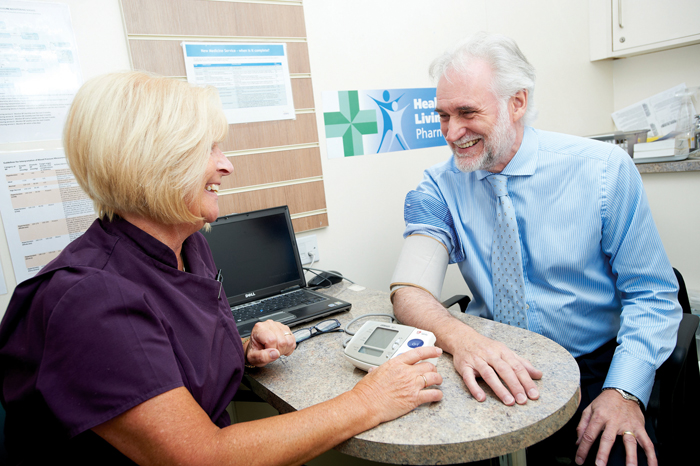HLPs at work in Yorkshire
In Practice
Follow this topic
Bookmark
Record learning outcomes
We find out how one region, West Yorkshire, is adapting healthy living pharmacies to its particular needs. Report by Sadia Naeem

Mike Wood, MP for Batley and Sten, at the launch of Shah's healthy living pharmacy in Liversedge
COMMUNITY PHARMACY West Yorkshire (CPWY), which represents over 530 pharmacies across the region, launched its healthy living pharmacy (HLP) programme in January 2012 with 30 pharmacies. There are now 118 pharmacies at level 1 accreditation.
The CPWY HLP programme of improving public health through the provision of high- quality services is supported by three specific criteria that pharmacies must demonstrate before they are awarded HLP status:
€¢ Staff development
At least two members of staff must undergo appropriate training to become a healthy living champion (HLC). Additionally, leadership training must be undertaken by one person to spearhead the initiative within the pharmacy.
€¢ Engagement
Pharmacies must engage with GPs and commissioners and also build local links with community and voluntary groups.
€¢ Premises development
Facilities on-site must include advanced IT equipment and a consultation room.
The benefits
HLPs are recognised by the community as offering a broad range of high quality health services, such as long-term condition support, weight management and smoking cessation. This is made official by the HLP quality mark and corresponding logo that may be displayed on HLP premises.
The requirement of two healthy living champions in each HLP is unique to CPWY's programme. The advantages of having two champions include mutual support and sharing of personal practice. It could additionally help pharmacies with problematic higher staff turnover.
A flagship component of the CPWY HLP programme is the CPWY Development Academy, which provides free training and support resources. As well as undergoing mandatory HLC and leadership training, HLP staff are encouraged to attend regular clinical- and skills- based sessions to maintain their knowledge and abilities. The academy also runs general sessions for all staff, including non-HLP personnel.
The route to accreditation
As with other HLP programmes, pharmacies in West Yorkshire must already meet contractual requirements for essential and advanced services, and be running at least two enhanced services. Accreditation can take many months and involves a rigorous application procedure, training, staff examinations and a launch event.
Application & training
Applications to become a HLP are judged by a group of comm- issioners, pharmacists and public health and CPWY personnel. In the initial waves, pharmacies in the more deprived communities were earmarked to be the first HLPs. If accepted, appropriate training is the next step.
Launch
Once accredited, pharmacies hold a launch event, which offers them the opportunity to showcase their services and involve the public immediately. Local MPs often attend as official guests.
The evaluation
An evaluation of the HLP programme is due to be published soon but CPWY public health specialist, Nigel Hughes, says the programme has seen a €marked increase in service delivery€ through community pharmacies and the public attitude has been €overwhelmingly positive€. Since the launch, considerable support has been received from the local authority public health department through HLP funding and new service commissioning.
€The programme has flourished due to the dedication of all involved to provide the best service they can to patients,€ says Robbie Turner, chief executive officer at CPWY. €It's a testament to what can be achieved through working in close partnership with community partners and commissioners.€
Centres of Excellence
Tehmina Sarvani, manager at Superdrug Pharmacy in Huddersfield, undertook HLC and leadership training and feels she has benefited from both. €I feel more confident about managing my staff and am able to better understand the needs of my patients,€ she says. Pharmacy Care Plus recently saw its second pharmacy, Shah's Pharmacy, become HLP-accredited. At the launch executive chairman Dev Shah spoke of becoming €a centre of excellence€.</box>

The future
CPWY is now recruiting a fifth wave of pharmacies to level 1 of the programme and has set targets to achieve 200 HLPs and launch level 2 accreditation by July 2014. It is also looking to significantly expand the development academy.
A promising future aspect of the CPWY programme is the development of links to secondary care via hospital pharmacists. The idea is that hospital pharmacists refer patients to specific HLP services on discharge, thereby building an important bridge between community and hospital pharmacy.
The importance of harnessing the qualities of non-HLPs is also evident. €It's important to build public health skills across all West Yorkshire pharmacies,€ says Nigel Hughes. €There are many non-HLPs that cannot join the programme due to the absence of two enhanced services, but they still provide excellent services for dementia and care home patients.€ CPWY is working on ideas that will help to develop public health skills in all pharmacies, not just HLPs.
Demonstrating cost- effectiveness and quality outcomes will be the main drivers for change. Currently, pharmacies are not provided with direct financial support to improve their facilities in line with HLP criteria and this may be an influential factor in the number of HLPs becoming accredited nationally in the foreseeable future.
€¢ For further information visit www.cpwy.org or follow @CPWY_HLP on Twitter.
